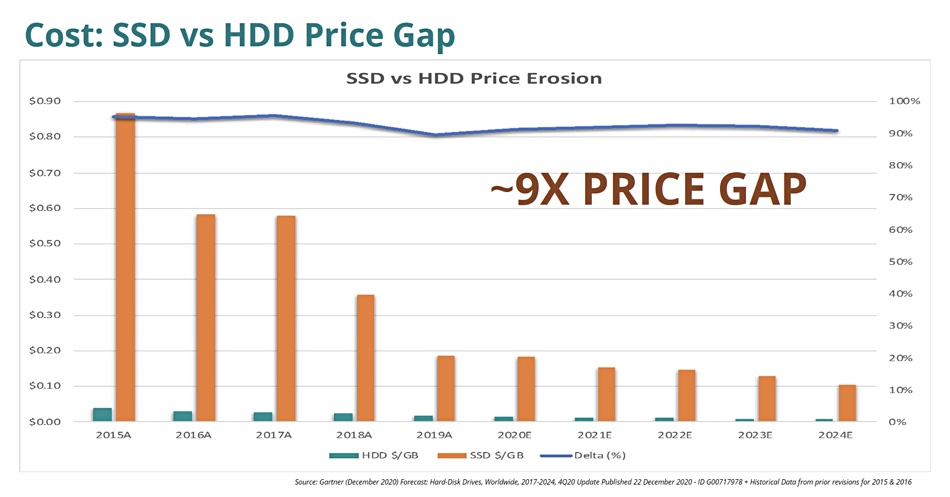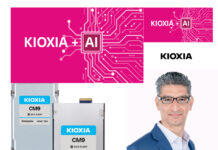Yesterday we reported VAST Data’s Howard Marks’s argument that hard drives are IO disks are IO sluggards, caching doesn’t work, and overall all-QLC flash array costs are the same as disk drive arrays.
VAST develops high end, high performance all-flash arrays. Infinidat also develops high-end, high performance arrays – but they are largely disk-based. Who better to ask to respond to Mark’s arguments?

Field CTO Ken Steinhardt told us: “We’re a bit surprised that the blog mentioned in that article is so heavily focused on component device specifications to the exclusion of full storage systems. I suppose that’s the kind of discussion that some vendors prefer when discussing their product, but we believe that it misses the mark.”
“At Infinidat we believe that customer value is derived from much higher macro level system characteristics – specifically high performance, 100 per cent availability, replication capabilities, ease-of-use, ecosystem support, post-sales support effectiveness, environmental issues, and financial considerations – but not media.”
According to Steinhardt, disk vs SSD comparisons are mis-guided because it’s like trying to “compare two different cars to determine which one will win a race based upon the horsepower of the engines. The greatest determining factor will be the skill and intelligence of the driver behind the wheel, and not the car itself. Just look at Lewis Hamilton.”&
Infinidat software is the reason that its arrays are faster than all-flash competitors, he says. The software makes its disk drive system fast. For example, in February 2019 an InfiniBox F6000 array pumped out 1.43 million IOPS and 15.2GB/sec throughput. Since then, the company has added support for NVMe over Fabrics – and the arrays go even faster. NVMe-oF cuts the Ethernet link transfer time from about 100 microseconds to around 30 microseconds.
According to Steinhardt, Infinidat’s software, using a Trie (digital tree) algorithm, can “provide ultra-high performance at true hyperscale – as opposed to the more limited approaches of hashing algorithms or the more primitive use of binary trees that are found in all other storage products.”
Cache hits and misses
In his article, Marks wrote that caching cannot make up for disk drive slowness in PB-scale arrays: “You would think that with big hard drives delivering so few IOPS/TB caching the hot data and metadata is a good idea… and it is, but a cache can’t completely make up for a lack of IOPS in it’s backing store, especially when facing demand peaks.”
Marks points out: ”the latency of each cache miss is the 5-10ms it takes to read from disk; 20-40 times the 500μs SSD read latency.” Increasing the cache size is a dead-end . “You would think that you could just make the cache bigger, to keep the number of cache misses down, but that ignores the fact that cache effectiveness falls off dramatically with cache size.”
In response, Steinhardt boasts: “Infinidat is unique among enterprise storage offerings in its use of patented true Deep Learning with our Neural Cache software to deliver radically higher cache-hit ratios than any other storage product in the market.”
Disk drives cost less than SSDs
Steinhardt argues Marks is wrong on the future of storage costs, and has “either misleading or outright inaccurate opinions… Here’s an independent take on the future of storage costs [see chart below]. This is from Gartner, which is hopefully a more credible source, and one that doesn’t have an axe to grind in this debate, unlike some vendors.”

Disk or SSD – Infinidat is agnostic
According to Steinhardt the technologies that” offer the best combinations of performance, reliability, capacity, and cost today for each of those levels respectively are DRAM, Flash, and HDDs. But that’s just today. Any or all of them can (and likely will) change for those dynamics in the future as technologies change and newer technologies like SCM, QLC, PLC, HAMR, MAMR, etc. continue to evolve.
“Infinidat can potentially use any of them, indeed we’ve already demonstrated such and we’re not going to arbitrarily praise or slam any of them – that would be silly. The order of magnitude differences in cost and performance give each of them a role to play in multi-PB data centres”
To conclude, Infinidat thinks that the basic storage medium is much less important than the software driving an array. The company says its proprietary software ensures that Infinidat disk array is faster than all-flash rival, inviting us to draw the conclusion of what it could accomplish using all-flash media.








